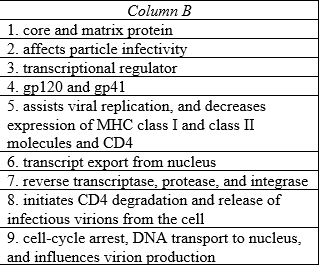Exam 13: Failures of the Bodys Defenses
Exam 1: Elements of the Immune System and Their Roles in Defense48 Questions
Exam 2: Innate Immunity: the Immediate Response to Infection26 Questions
Exam 3: Innate Immunity: the Induced Response to Infection65 Questions
Exam 4: Antibody Structure and the Generation of B-Cell Diversity80 Questions
Exam 5: Antigen Recognition by T Lymphocytes87 Questions
Exam 6: The Development of B Lymphocytes46 Questions
Exam 7: The Development of T Lymphocytes42 Questions
Exam 8: T Cell-Mediated Immunity60 Questions
Exam 9: Immunity Mediated by B Cells and Antibodies61 Questions
Exam 10: Preventing Infection at Mucosal Surfaces42 Questions
Exam 11: Immunological Memory and Vaccination63 Questions
Exam 12: Coevolution of Innate and Adaptive Immunity32 Questions
Exam 13: Failures of the Bodys Defenses76 Questions
Exam 14: Ige-Mediated Immunity and Allergy40 Questions
Exam 15: Transplantation of Tissues and Organs88 Questions
Exam 16: Disruption of Healthy Tissue by the Adaptive Immune Response64 Questions
Exam 17: Cancer and Its Interactions With the Immune System49 Questions
Select questions type
Christiana Carter had no obvious problems until she was 18 months old,when she stopped gaining weight,her appetite became poor,and she had recurrent episodes of diarrhea.At 24 months,Christiana developed a cough with pulmonary infiltrates unresponsive to treatment with the antibiotics clarithromycin and trimethoprim/sulfamethoxazole.Within 3 months,she developed lymphadenopathy,hepatosplenomegaly,and fevers.A computed tomography scan revealed enlarged mesenteric and para-aortic lymph nodes.A biopsy of an enlarged axillary lymph node revealed acid-fast bacilli,and cultures from the lymph node and blood grew Mycobacterium fortuitum.HIV was ruled out after negative tests by ELISA and PCR.Serologic testing for tetanus antitoxoid antibody showed a normal post-vaccination level.Christiana's peripheral blood mononuclear cells (PBMCs)were cultured with interferon-γ plus lipopolysaccharide with no significant increase in TNF-α production.A variety of broad-spectrum and anti-mycobacterial antibiotics were administered,lowering the fever,and over the course of the next 2 months Christiana began to gain weight but continued to show signs of persistent infection.Which of the following is the most likely explanation for these clinical findings?
(Multiple Choice)
4.7/5  (35)
(35)
Individuals with an antibody deficiency are more susceptible to infections by all of the following except _____.
(Multiple Choice)
4.7/5  (40)
(40)
 -In reference to column B, which of the protein products are present in the virion?
-In reference to column B, which of the protein products are present in the virion?
(Short Answer)
4.8/5  (40)
(40)
Match the deficiency disease with its specific abnormality.
Correct Answer:
Premises:
Responses:
(Matching)
4.8/5  (42)
(42)
All of the following are associated with hereditary angioedema except _____.
(Multiple Choice)
4.9/5  (43)
(43)
A.What type of immune deficiency would you see in a child lacking the common γ chain of the receptor for cytokines IL-2,IL-4,and IL-7,among others? Explain your answer.
B.Why would you see the same type of immunodeficiency in a child lacking Jak3 kinase function?
C.What treatment might be possible to remedy this immunodeficiency?
(Essay)
4.8/5  (40)
(40)
Which of the following contribute to new epidemics and the long-term survival of the influenza virus in the human population? (Select all that apply.)
(Multiple Choice)
4.9/5  (39)
(39)
_____ participates in the T-cell cytoskeletal reorganization required for T-cell cytokine production and cell-mediated interactions.
(Multiple Choice)
4.9/5  (30)
(30)
The mode of evolution responsible for the production of recombinant influenza viruses composed of a genome derived from two different influenza variants is called _____.
(Multiple Choice)
4.9/5  (40)
(40)
What would you predict might happen to the course of the HIV infection in a person who developed toxic shock syndrome while in the latent phase of HIV? Explain your answer.
(Essay)
4.7/5  (33)
(33)
Which of the following statements regarding herpes simplex virus is false?
(Multiple Choice)
4.8/5  (40)
(40)
Epstein-Barr virus infects and establishes latency in _____,gaining entry by binding to _____.
(Multiple Choice)
4.8/5  (37)
(37)
Which of the following is not associated with the reactivation of herpesviruses?
(Multiple Choice)
4.8/5  (43)
(43)
A.Deficiencies in antibody production can be due to a variety of underlying genetic defects.Name two immunodeficiency diseases,other than the severe combined immunodeficiencies,in which a defect in antibody production is the cause of the disease,and for which the underlying genetic defect is known.For each disease,say (i)how antibody production is affected,and (ii)what the underlying defect is and why it has this effect.
B.What is the main clinical manifestation of immunodeficiency diseases in which antibody production is defective but cell-mediated immune responses are intact?
(Essay)
4.9/5  (37)
(37)
Mutations affecting all of the following except _____ interfere directly with the rearrangement of immunoglobulin and T-cell receptor genes.
(Multiple Choice)
4.9/5  (29)
(29)
Showing 61 - 76 of 76
Filters
- Essay(0)
- Multiple Choice(0)
- Short Answer(0)
- True False(0)
- Matching(0)